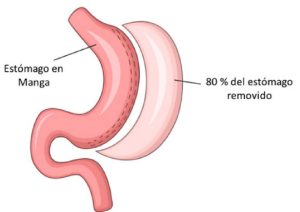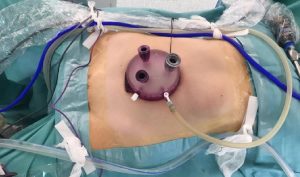What is bariatric surgery for severe obesity??
It is a procedure that is done to help lose weight when other treatments for severe obesity have not worked. The objective of these surgeries is to restrict the amount of food that can be consumed. In current times the most common procedures that are safe and have proven long term efficacy are the gastric sleeve and the gastrojejunal bypass which they can be done via laparoscopy. This method is done through small incisions introducing a laparoscope connected to a video camera allowing the surgeon to see an amplified image of the internal organs on a TV monitor.
What should I expect from this surgery?
The reported results go from good to excellent. It is expected to reduce excess weight of between 50% and 80% depending on how well the program is followed as well as the surgery. Health issues associated with overweight such as diabetes, sleep apnea, systemic arterial hypertension and hypercholesterolemia will be reduced or go away in a high percentage of cases. Quality of life, self-esteem and physical condition will also improve.
Am I a candidate for this surgery?
This surgery is done in patients who have failed in non-surgical treatments to sustainably lose weight and which present a high body mass index of 40 or more, or 35 with one or more of the following health issues: heart attack, hypertension, osteoarthritis, cancer, sleep apnea or diabetes.
OUR SURGERIES
Gastrojejunal Bypass
This is the surgery to which others compare. Very good results are obtained long term. In patients with gastroesophageal reflux or metabolic diseases such as diabetes it is the procedure of choice since it corrects both conditions. It is a procedure that reduces the capacity of the stomach and bypasses it connecting to a segment of the intestine so that part of the ingested food is not absorbed.

Gastric Sleeve
It is a very safe procedure which consists in removing 70% to 80% of the stomach forming a sleeve-like shape, reducing the amount of food that is needed to feel satiety.

Revision Surgery
These are procedures required whenever there is a medical complication of a bariatric procedure such as:
- Insufficient weight loss or regaining weight.
- Conversion of a procedure in disuse such as the gastric band to a more efficient one such as bypass or gastric sleeve.
It requires a high skill level and it demands to be done by very experience surgeons. Dr. Alfonso Villalobos has 22 years of experience as a laparoscopic surgeon and has done bariatric surgery for 18 years with extensive experience in all types of revisions.
Single Port Surgery
More than a procedure it is an approach. Instead of doing a conventional laparoscopic surgery through 4 or 5 ports, some procedures can be done through this platform which allows the entry of the tools and the camera through a single port done through the umbilical scar with the help of a laparoscope or flexible lens, obtaining a very satisfactory cosmetic result.

Surgery for Diabetes (Metabolic Surgery)
Some surgical procedures have shown to be the best long term treatment not just for obesity but for Diabetes Mellitus type 2 as well. The patient can improve their control, reduce the amount of needed medication, delay the evolution of the disease, prevent complications and even achieve remission (reported in scientific studies in between 60% and 80% of post operatory patients) of the disease (normal basal glucose levels, normal glycosylated hemoglobin, without requiring medication), which will substantially improve the quality of life of the Diabetes Mellitus patient type 2 and will prolong their survival. These results have been observed in patients with severe overweight (class II and III) as well as in patients with overweight or obesity class I. Since 2022 the Clinical Guidelines of the American Diabetes Association (ADA) contemplates surgery as an option for treating obesity in all class levels.





